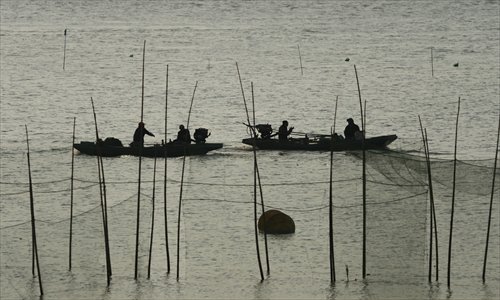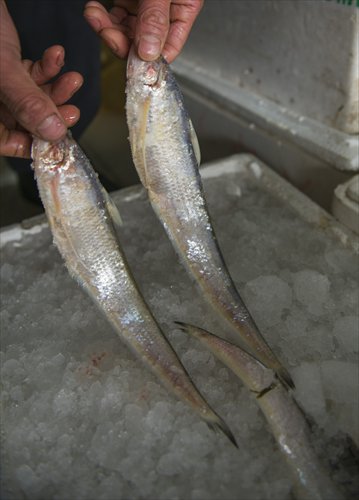The taste of extinction

Boats on the Yangtze River cast nets for Yangtze saury. Photo: CFP
The port at Xijiagang town in Chongming county has only just got back into order after hundreds of traders and their vehicles clogged the roads and docks for weeks. They were there for one reason - to buy one of the most expensive fish in the world.
Now that the season for the Yangtze saury has ended the town can get back to normal. This fish is one of the three famous fish species in the Yangtze River and has frequently hit the headlines with the prices it commands - up to 10,000 yuan ($1,603) for 500 grams.
Apparently, the catch this year didn't meet the expectations of some of the townsfolk. "Catching a big saury is like winning a lottery. These days it's a real surprise if we find 10 saury in a net - in the past there were usually hundreds of saury in one net," said local fisherman Xi Meihua.
This town is the main fishing point for Yangtze saury in Shanghai. Elsewhere along the Yangtze River, fishermen have been complaining the same way. "I've been working on the boat for more than a month and all I gained for this year were five saury," sighed Qiu Guoxiang, who has been fishing in Taizhou, Jiangsu Province, for 35 years.
Dramatic drop
Once plentiful, the annual catch of Yangtze saury has dropped dramatically from 3,750 tons in 1973, to 370 tons in 1983 and under 100 tons annually since 2002, according to the Freshwater Fisheries Research Center of the Chinese Academy of Fishery Sciences. Last year, the catch fell to under 40 tons.
Around five years ago, one of the three famous fish species of the Yangtze River, the reeves shad, was pronounced extinct. Now many are worried about the future of the Yangtze saury. While some have blamed overfishing for endangering the species, others have pointed to fundamental changes in the ecological environment and the industrial pollution of the river.
Yangtze saury is a long, thin, glistening silvery fish. It has been famous for its subtle, delicious taste for ages but in recent years the once common fish, a regular seasonal dish in every household, has become a luxury food. The reason for this is its scarcity. The Yangtze saury is a migrating fish which, after being born in the river, heads out to the East China Sea. In February or March the following year, the mature saury swim back to the river to spawn.
Gao Yaming is the director of the Taizhou Fishery and Fishing Harbor Supervision Management Station and said overfishing in the ocean was putting the species at danger. "Many mature saury are failing to make their way back into the Yangtze River because they are being caught in the ocean."
Every year in March or April, fishery authorities and the water police in Shanghai and Jiangsu combine to crack down on illegal fishing activities in the areas between the Yangtze River and the East China Sea. Unfortunately, the number of illegal fishing boats hasn't apparently been affected by the crackdowns. The illegal fishermen, of course are driven by the profits, which have been very attractive in recent years.

A fishmonger selects two prime Yangtze saury weighing over 100 grams. Photo: CFP
Another struggle
Even though some Yangtze saury do make their way past the scores of illegal fishing nets into the river, they then face another struggle to find a place to spawn. Traditionally Yangtze saury have spawned in the branches of the Yangtze River - small tributaries with slower currents. But Professor He Wei from the Shanghai Ocean University said that spawning sites for the saury have basically disappeared.
"For their flood controls, the cities have built levees along the lakes and tributaries that lead to the Yangtze River. The levees have water locks to allow boats to move and to change water levels. The locks are not closed all the time so there are times when the saury can swim to their familiar grounds to spawn. But overall there have been huge changes to their spawning grounds."
It has been reported that only one in 10 Yangtze saury can now survive the thickly spread illegal fishing nets and find places that are suitable to spawn in. The construction of water conservation projects has also seriously affected the environment for the saury. "After these projects were built, spring tides gradually disappeared," Gao Yaming said.
Professor He said he based his conclusions on the experiences of veteran fishermen on the Yangtze River who said large schools of Yangtze saury always used to arrive with the spring tides.
The development of industry along the Yangtze River is also often believed harmful to the saury. Director Gao said that the construction of piers and factories along the river had destroyed the wetlands and the polluted water discharged by these factories, especially some of the chemical factories, had seriously affected the survival rates of Yangtze saury.
Professor He agreed that these elements did exert a negative influence but he insisted that the impact of the factories could be exaggerated. "Above all, the current of the Yangtze River is so strong and the river is so large. I don't think the pollution levels are high enough to kill saury," the academic said. "Personally I believe that in terms of the impact on fish, a single Three Gorges project exerts a larger role than all the factories along the river do together."
As well as illegal netting in the ocean, illegal netting in the Yangtze River (usually done close to piers in river cities like Jingjiang, Jiangyin and Taizhou) has also been blamed for threatening the survival of the saury. In a bid to better protect the species, the State agriculture authority has ruled that only fishermen with special licenses can set their Yangtze saury nets in the river in March and April.
However, although the city's agricultural authority issued just 125 saury fishing licenses last year, nearly 1,000 fishing boats were seen crowding the waters in the prime saury fishing season, the Youth Daily reported.
Taking a chance
"Fishermen will take a chance at illegal netting because of the profits involved," said Zhao Yimin, the office director of the Yangtze River Basin Fishery Resource Management Committee. When these tiny fish were fetching some 10,000 yuan per 500 grams in 2012, illegal fishing boats crammed the waters close to the port at Xijiagang. Things changed a little for the better this year as the price dropped to around 6,000 yuan per 500 grams.
"When the price dropped this year, illegal fishermen worked mostly during the nights in small kayaks, or just made flotation devices from polystyrene foam or old car tires. In the past, many did it openly in broad daylight from their fishing boats."
The potential for profits is attractive but Zhao pointed out that unlicensed fishermen who were caught were not penalized heavily. "If we want to charge unlicensed fishermen formally we have to collect sufficient evidence, like the fish they have caught or their fishing nets. When we tried to confiscate their nets (which could cost around 10,000 yuan - a fortune for some poor fishermen), some jumped into the river to commit suicide. We had to rescue them not prosecute them. And it's hard to assemble evidence. Unlike crime on the land where street cameras can always help, we don't have cameras on the water."
Zhao said the understanding of the issue differed greatly at different administrative levels, which also hindered the law enforcement work in this sector. "Some departments think it is just a few fishermen going after a few fish. It's not a big deal. Why bother arresting these poor men? This attitude is quite common. But fish, especially the fish that are facing extinction, are the resources of the country."
At present, experts say the most urgent task is more research into methods of artificial propagation of Yangtze saury to prevent the species from becoming extinct. "There are many challenges involved. The salinity changes are a key problem that need to be solved," said professor He.
Newspaper headline: One of Shanghai’s favorite fish is now becoming rare and hugely expensive